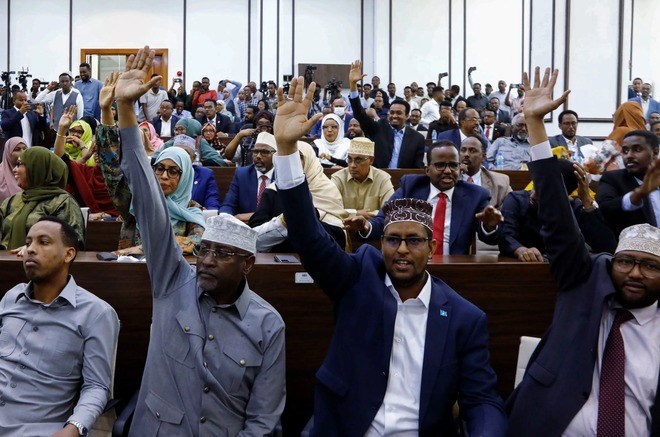Friday April 26, 2024
By Hussien Mohamed Yusuf

Somali members of Parliament vote on a resolution on the procedural rules for constitutional amendments, Mogadishu, Somalia, January 24, 2024. © 2024 REUTERS/Feisal Omar
Somalia, a country with a tumultuous history marred by political instability, environmental crises, and governance challenges, faces a crucial juncture in its path towards stability and development. Amidst ongoing debates surrounding constitutional reform, there is a need to delve into the pressing need for reprioritizing the Somali government's agenda. By examining the complexities of political instability, climate change, humanitarian crises, and governance failures, it is important that constitutional reform should not take precedence over addressing these immediate challenges. Through a comprehensive analysis of each issue, most Somalis advocate for a pragmatic approach that focuses on addressing urgent needs while laying the groundwork for long-term institutional reforms.
Somalia's trajectory towards stability and development has been hindered by decades of conflict, political instability, and governance failures. Despite efforts to navigate these challenges, the country continues to grapple with pressing issues ranging from environmental degradation to humanitarian crises. Amidst these challenges, the debate on constitutional reform has garnered attention as a potential avenue for institutional development. However, most Somalis contend that the Somali government's fixation on constitutional reform detracts from addressing more immediate and pressing concerns, necessitating a reevaluation of national priorities.
Political Instability and Pacification Efforts
The roots of Somalia's political instability lie in deep-seated clan rivalries, insurgency groups, and weak governance structures. Efforts to achieve sustainable peace and stability have been impeded by ongoing conflicts and the proliferation of armed militias. Constitutional reform, while important for institutional development, cannot supersede the immediate need for pacification efforts to ensure the safety and security of citizens. Comprehensive disarmament initiatives, national reconciliation processes, and inclusive governance mechanisms are essential components of fostering lasting peace in Somalia.
Climate Change and Environmental Challenges
Somalia is among the countries most vulnerable to the adverse effects of climate change, with recurrent droughts, desertification, and extreme weather events exacerbating environmental degradation and humanitarian crises. Urgent action is required to mitigate the impact of climate change, including implementing sustainable development practices, investing in water management infrastructure, and promoting renewable energy initiatives. Constitutional reform, though integral to long-term governance strategies, cannot address the imminent threat posed by environmental crises without concurrent efforts to build climate resilience and adaptation capacities.
Drought and Humanitarian Crises
Drought-induced food insecurity and humanitarian emergencies have become recurrent occurrences in Somalia, leading to widespread suffering, displacement, and food insecurity. The government's primary focus should be on providing humanitarian assistance, enhancing drought resilience through agricultural reforms, and improving access to clean water and food supplies. While constitutional reform is crucial for fostering inclusive governance, it cannot alleviate the immediate humanitarian crises faced by Somali communities without concerted efforts to address root causes and provide timely assistance.
Maladministration and Governance Challenges
Somalia continues to grapple with systemic issues of corruption, nepotism, and weak governance structures, which undermine public trust and impede socio-economic development. Addressing maladministration requires comprehensive reforms in public institutions, strengthening the rule of law, and promoting transparency and accountability. Constitutional reform cannot effectively combat maladministration without concurrent efforts to overhaul administrative practices and enhance governance mechanisms.
Prioritizing Immediate Needs Over Long-term Reforms
In reprioritizing Somalia's national agenda, the government must adopt a pragmatic approach that addresses immediate challenges while laying the groundwork for long-term reforms that can build a democratic and inclusive society, addressing urgent priorities such as pacification, climate resilience, humanitarian assistance, and governance reforms must be the top issues in the agenda of the sitting administration.
Somalia's journey towards stability, prosperity, and good governance is fraught with challenges that demand immediate attention and decisive action. While constitutional reform holds significance in shaping the nation's future, it cannot be prioritized at the expense of addressing pressing issues such as political instability, environmental crises, humanitarian emergencies, and governance failures.
Therefore, the Somali government must reprioritize its agenda to focus on the most urgent needs of its people, laying the foundation for sustainable development and inclusive governance in the long run. Through concerted efforts to address immediate challenges, Somalia can chart a course towards a more resilient, equitable, and prosperous future for all its citizens.
Hussien Mohamed Yusuf
[email protected]